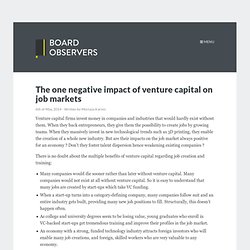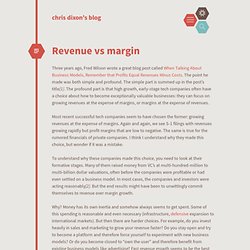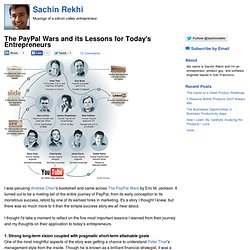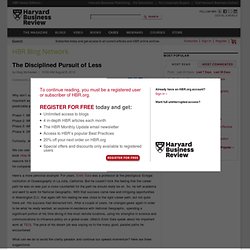

Board Observers Weekly - May 6th, 2014. The one negative impact of venture capital on job markets. Venture capital firms invest money in companies and industries that would hardly exist without them.

When they back entrepreneurs, they give them the possibility to create jobs by growing teams. When they massively invest in new technological trends such as 3D printing, they enable the creation of a whole new industry. But are their impacts on the job market always positive for an economy ? Don’t they foster talent dispersion hence weakening existing companies ? There is no doubt about the multiple benefits of venture capital regarding job creation and training: Many companies would die sooner rather than later without venture capital.
Sequoia's Investment Memo on YouTube – The Infovore's Dilemma. It is very hard to get genuine transparency on what VCs look for when making an investment.

Some investors share their investment criteria, but rarely how they have assessed opportunities against those criteria. The only public domain investment memo I have found is by Roelof Botha recommending that Sequoia make a seed investment in Youtube. Roelof has supported some of the most exceptional companies over the past decade including Youtube (I think one of his first), Instagram, Tumblr, Evernote, Square, MongoDB and others.
It is a rare opportunity to see how such an accomplished investor thought about the opportunity behind closed doors and communicated his thoughts to the partnership. Introduction In 3 succinct paragraphs Roelof articulates his primary theses that underpin why he thinks YouTube is a compelling opportunity. Roelof lets his simple thesis and supporting macro trends stand for themselves. Deal Competition Hiring Plan Key Risks Recommendation Final Observations. The Ripple Effects of Disruptive Models. Last week, we discussed the impact of services such as Uber or Airbnb.

More broadly, no sectors is immune to major overhauls. Today, we’ll have a look at the impact of Disruptors. Nested in Paris’ Le Marais neighborhood, a clever incubator/think-thank called TheFamily, made its mission to chronicle the digital transformation of our society. Largely inspired by the iconic Ycombinator incubator, TheFamily funds and provides all sorts of services to a hundred plus startups. Drivy Raises $8.3 Million For Its Community-Based Car Rental Service. French startup Drivy raised a Series A round of $8.3 million (€6 million) from Index Ventures and Alven Capital.

These two investors already put $2.8 million (€2 million) in seed funding. As a reminder, Drivy allows anyone to rent out their car. On the other side, you can go to Drivy’s app or website to rent a car, usually for less than what it would cost you in a brick and mortar car rental agency. In addition to spending less money, you will receive the same insurance coverage that you would expect when you rent a car. “I first played around the idea of building a ride-sharing service for short rides,” Drivy founder and CEO Paulin Dementhon told me.
Revenue vs margin. Three years ago, Fred Wilson wrote a great blog post called When Talking About Business Models, Remember that Profits Equal Revenues Minus Costs.

The point he made was both simple and profound. The simple part is summed up in the post’s title[1]. The profound part is that high growth, early-stage tech companies often have a choice about how to become exceptionally valuable businesses: they can focus on growing revenues at the expense of margins, or margins at the expense of revenues. Most recent successful tech companies seem to have chosen the former: growing revenues at the expense of margins. Again and again, we see S-1 filings with revenues growing rapidly but profit margins that are low to negative. To understand why these companies made this choice, you need to look at their formative stages. Why? The root cause here is a deeply held belief throughout the business world that exceptional revenue growth is more likely than exceptional margins.
The PayPal Wars and its Lessons for Today's Entrepreneurs. I was perusing Andrew Chen's bookshelf and came across The PayPal Wars by Eric M.

Jackson. It turned out to be a riveting tail of the entire journey of PayPal, from its early conception to its monstrous success, retold by one of its earliest hires in marketing. It's a story I thought I knew, but there was so much more to it than the simple success story we all hear about. I thought I'd take a moment to reflect on the five most important lessons I learned from their journey and my thoughts on their application to today's entrepreneurs. 1. 2. 3. 4. In the early days fraud became a horrendous issue for PayPal. It's an important lesson in that all startups have rocky roads, even the successful ones. 5. The most important tactic that I think is a key lesson for today's entrepreneurs was building a consumer brand and strong customer affinity towards it. The Disciplined Pursuit of Less - Greg McKeown. By Greg McKeown | 10:00 AM August 8, 2012 Why don’t successful people and organizations automatically become very successful?

The PayPal Wars: Battles with eBay, the Media, the Mafia, and the Rest of Planet Earth: Eric M. Jackson: 9781936488599: Amazon.com: Books.